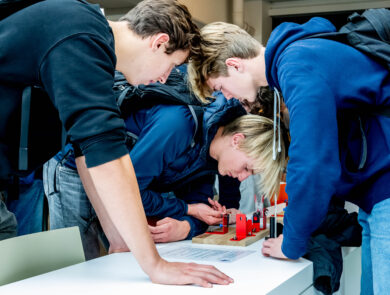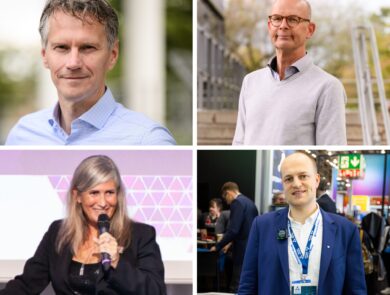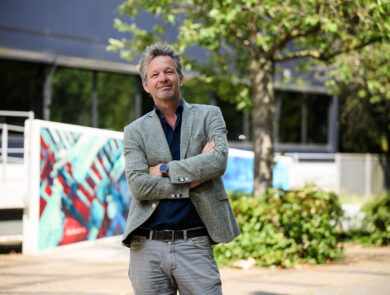German entrepreneurs also excited about the Einstein Telescope
The NMWP.NRW state cluster in Düsseldorf is closely following developments surrounding the Einstein Telescope. The technology cluster, funded by the North Rhine-Westphalian Ministry of Economic Affairs, brings together entrepreneurs and scientists from many key technologies and encourages innovative projects wherever possible. ‘The Einstein Telescope offers unprecedented opportunities,’ says Dr Matthias Grosch, project manager, ‘both economically and scientifically. Knowledge institutes and companies are already preparing for the emergence of this mega-project.’
Nowhere else in Europe is the density of universities, colleges and research institutes as high as in North Rhine-Westphalia, just across the Dutch border near Vaals and Kerkrade. There are more than 128 institutions, as can be seen on the website of NanoMikroWerkstoffe Photonik.NRW, or NMWP.NRW for short. These range from the top university RWTH in Aachen to small laboratories where researchers and scientists work on innovations with companies. Among other things, they are involved in laser and vacuum technology and new materials – fields of research that are directly related to the Einstein Telescope.

High on the agenda
‘You can be sure that the Einstein Telescope is being closely monitored there,’ emphasises Matthias Grosch. “Tests are already being carried out at many locations on materials, cooling methods and the damping of possible vibrations. The laser specialists already have promising prototypes. The project is definitely alive and active. Companies and researchers are already exchanging knowledge, but are still cautious when it comes to revealing exactly what they are working on. Behind the scenes, the telescope is getting more attention. The project is also becoming more concrete and is moving from the purely scientific phase to the valorisation phase. Ideas are now being turned into innovations and products.”
It’s never too soon
Matthias Grosch, a chemist who enjoys bringing science and business together, also sees great opportunities on the German side of the Euregio Meuse-Rhine. ‘Even if one of the other two candidates – Saxony or Sardinia – is chosen, there are great opportunities for specialised companies and institutes in our region. After all, once the contract has been awarded, there will be a call for tenders, and companies with relevant knowledge will naturally have an advantage. They can also leverage this advantage in other parts of Europe. That’s why we need to build momentum now; there’s not much time left.’
The project manager’s words are fully in line with the vision of the ministers of economic affairs of Belgium, the Netherlands and North Rhine-Westphalia, who visited the ‘ETpathfinder’ in Maastricht on 10 March. This is where a functional prototype of the telescope is located, the precursor to the precious underground ‘triangle’ that will one day measure even the slightest gravitational waves.
Economic boost
Four ministers, including Mona Neubaur from North Rhine-Westphalia, once again emphasised the great economic potential and called for even stronger lobbying to bring the project to the Euregio Meuse-Rhine.
The joint appeal is to involve the business community now. ‘Understandable,’ Matthias Grosch continues. “The construction alone will bring a significant economic boost with hundreds of person-years of work and millions in investment. This will then lead to structural employment at all levels. But there is much more at stake. Innovation will be accelerated. Universities and colleges will attract researchers and students. The knock-on effect on other industries related to laser and vacuum technology, aerospace, optoelectronics, software, AI, geology and materials is considerable. Describing the Einstein Telescope as an economic boost is therefore something of an understatement. This region will gain a knowledge centre comparable to CERN in Switzerland, which is home to elementary particle research.”
Excellent ecosystem
Matthias Grosch is optimistic about the chances of bringing the Einstein Telescope to this region. “We already have an excellently functioning ecosystem with the relevant specialisations necessary for construction and further development. It is also a major European project, which we have a lot of experience with in this region. Cross-border cooperation is certainly nothing new. All in all, I see great opportunities. However, we must wait and see and, in the meantime, take further preparatory measures with our institutes and companies. From NMWP.NRW with a view across the Belgian and Dutch borders. This project is important for the entire region, and we want to and will play a decisive positive role in it.”



